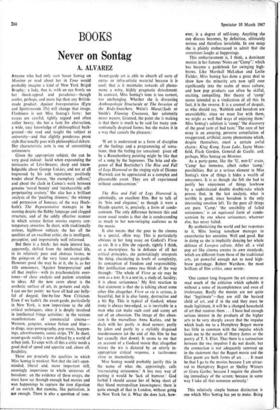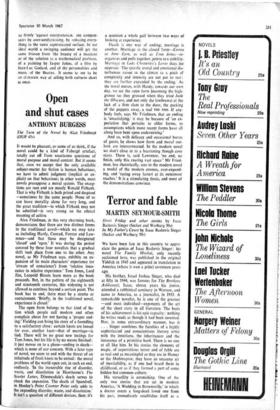Never on Sontag BOOKS
A. ALVAREZ
Anyone who had only seen Susan Sontag on Monitor or read about her in Time would probably imagine a kind of New York Brigid Brophy: a lady, that is, with an eye firmly on her shock-appeal and paradoxes—though cooler, perhaps, and more hip than any British- made product. Against Interpretation (Eyre and Spottiswoode 35s) will change that image. Flashiness is not Miss Sontag's forte: her essays are careful, tightly argued and often rather heavy; she has a taste for abstraction, a wide, easy knowledge of philosophical back- ground—she read and taught the subject at university—and that slightly ponderous prose style that usually goes with philosophical debate. Her characteristic note is one of unremitting seriousness.
Given the appropriate subject, she can be very good indeed: lucid when expounding the intricacies of Levi-Strauss; sharp and know- ledgeable about George Lukics, and not at all impressed by his cult reputation; positively tender about Pavese, 'the exemplary sufferer,' and about the clash in Camus's work between genuine 'moral beauty' and 'inexhaustible self- perpetuating oratory.' She also has a brilliant analysis of the 'puzzling thinness,' the whimsy and pretension of Ionesco, of the way Hoch- hush's The Representative manages to be moving despite the flabby language and clogged structure, and of the oddly effective manner in which science fiction movies express con- temporary anxieties. In short, with traditionally serious, highbrow subjects she has all the qualities of an excellent critic; she is intelligent, perceptive, and impressively well informed.
But there is a hitch: her main interest has, apparently, shifted from the intellectual life, in its relatively pure and abstract forms, to the goings-on of the very latest avant-garde. However good she may be at it, she is, as her title announces. 'Against Interpretation' and all that implies—with its psychoanalytic over- tones—of close analysis and patient attention to ideas. All she now cares about is the aesthetic surface of art, its gestures and style. I can see her point: we have all had our belly- ful of dogged, line-by-line New Criticism. Even if we hadn't, the avant-garde, particularly in New York, is now impervious to the old critical techniques, since it is deeply involved in intellectual fringe activities: in the various manifestations of commercial cinema— Western, gangster, science fiction and blue— in drugs, near-pornography, pop music, happen- ings, advertisements, comic strips, TV. In short, avant-garde reality is now defined by a world of urban junk. To cope with all this a critic needs a good deal of speed and appetite and, above all, flexibility.
These are precisely the qualities in which Miss Sontag is weakest. Not that she isn't open- minded, liberal and, more important still, seemingly impervious to whole universes of boredom: on the evidence of these essays, she must have sat through enough bad movies and wan happenings to rupture the iron digestion of an ostrich. But stamina, like patriotism, is not enough. There is also a question of tone. Avant-garde art is able to absorb all sorts of extra- or infra-artistic material because it is cool; that is it maintains towards all pheno- mena a witty, highly pragmatic detachment. In contrast, Miss Sontag's tone is too earnest, too unchanging. Whether she is discussing Anthropologie Structurale or The Invasion of the Body-Snatchers, Weiss's Marat I Sade or Smith's Flaming Creatures, her solemnity never wavers. Granted, the point she is making is that there is much to be said for many con- ventionally despised forms; but she makes it in a way that cancels the pleasure: `If art is understood as a form of discipline of the feelings and a programming of sensa- tions, then the feeling (or sensation) given off by a Rauschenberg painting might be like that of a song by the Supremes. The brio and ele- gance of Bud Boetticher's The Rise and Fall of Legs Diamond or the singing style of Dionne Warwick can be appreciated as a complex and pleasurable event. They are all experienced without condescension.'
The Rise and Fall of Legs Diamond is, admittedly, an excellent film. But to talk of its 'brio and elegance,' as though it were a Haydn quartet, is, precisely, a form of conde- scension. The only difference between this and more usual modes is that she is condescending as much to her non-swinging audience as to the movie.
It also means that she goes to the cinema in a special, effete way. This is particularly obvious in her long essay on Godard's Vivre sa vie. It is a film she regards, rightly I think, as a masterpiece. So in defiance of all her critical principles, she painstakingly interprets the thing, elucidating its levels of complexity, its conception of freedom and responsibility. Her justification comes two thirds of the way through : The whole of Vivre sa vie may be seen as a text. It is a text in, a study of, lucidity; it is about seriousness.' My first reaction to that statement is that she is talking about some other film altogether. Vivre sa vie is serious, is beautiful, but it is also funny, destructive and a bit flip. This is typical of Godard, whose irony is always two-edged, as is inevitable in a man who can make such cool and canny art out of an obsession. The image of this obses- sion is the marvellous Anna Karina, and he deals with her partly in dead earnest, partly by jokes and partly by a stylishly disguised murderousness (at the end of this film he has her casually shot down). It seems to me that an account of a Godard movie that altogether misses the wit is dictated by an utterly in- appropriate critical response, a tactlessness close to insensitivity.
Miss Sontag would probably justify this in the name of what she, approvingly, calls 'excruciating seriousness.' A less rosy way of putting it would be 'lack of humour.' God forbid I should accuse her of being short of that bland metropolitan knowingness; there is quite enough of that in London, without going to New York for it. What she does lack, how- ever, is a degree of self-irony. Anything she can discuss becomes, by definition, ultimately serious and therefore inviolable. In one essay she is plainly embarrassed to admit that she sometimes laughs at happenings.
This embarrassment is, I think, a dominant motive in her famous `Notes on "Camp",' which has become a guidebook for swinging high- brows. Like Marshall McLuhan and Leslie Fielder, Miss Sontag has done a great deal to show how the minority arts now spill over significantly into the realm of mass culture, and how pop products can often be skilful, exciting, compelling. Her theory of `camp' seems intended as a vindication of all this. In fact, it is the reverse. It is a counsel of despair, as who should say, 'Rubbish and boredom are unavoidable; since we must live with them, we might as well find ways of enjoying them.' Miss Sontag's solution is 'camp,' the discovery of the good taste of bad taste.' The core of her essay is an amusing, perverse compilation of exaggerated, artificial, corny phenomena which, despite themselves, exert a certain awful charm : King Kong, Swan Lake, Jayne Mans- field, Flash Gordon, General de Gaulle, and, perhaps, Miss Sontag on Monitor.
As a party-game, like the non-U' craze, 'Camp' has immense, albeit rather 'camp,' possibilities. But as a serious element in Miss Sontag's view of things it hides a wealth of uneasiness. It is as though she felt she had to justify her enjoyment of things lowbrow by a sophisticated double double-take which proves that, in the last analysis, what is terrible is good, since boredom is the only interesting emotion left. To the pure all things are pure. 'Camp,' the sensibility of failed seriousness,' is an equivocal form of conde- scension by one whose seriousness, whatever else, has never failed.
By aestheticising the world and her responses to it, Miss Sontag somehow manages to anaesthetise her anxieties. Well and good. But in doing so she is implicitly denying her whole defence of Lum pen culture. After all, a vital pop art like cinema creates its own standards, which are different from those of the traditional arts, yet powerful enough not to need high- brow patronage. Robert Warshow, the most brilliant of film critics, once wrote: 'One cannot long frequent the art cinema or read much of the criticism which upholds it without a sense of incompleteness and even of irrelevance. Really the movies are not quite that "legitimate"—they are still the bastard child of art, and if in the end they must be made legitimate, it will be a changed household of art that receives them ... I have had enough serious interest in the products of the higher arts to be very sharply aware that the impulse which leads me to a Humphrey Bogart movie has little in common with the impulse which leads me to the novels of Henry James or the poetry of T. S. Eliot. That there is a connection between the two impulses I do not doubt, but the connection is not adequately summed up in the statement that the Bogart movie and the Eliot poem are both forms of art . . . It must be that I go to the movies because I am attrac- ted to Humphrey Bogart or Shelley Winters or Greta Garbo; because I require the absorb- ing immediacy of the screen; because in some way I take all that nonsense seriously.'
This relatively simple human distinction is one which Miss Sontag has yet to make. Being
so firmly 'against interpretanc,n. she compen- sates by over-aestheticising. by reducing every- thing to the same sophisticated surface. In ner ideal world a swinging audience will get the same frisson from the beauty of a machine or of the solution to a mathematical problem. of a painting by Jasper Johns. of a film by Jean-Luc Godard, and of the personalities and music of the Beatles. It seems to me to be an elaborate way ot selling both cultures short at once.































 Previous page
Previous page